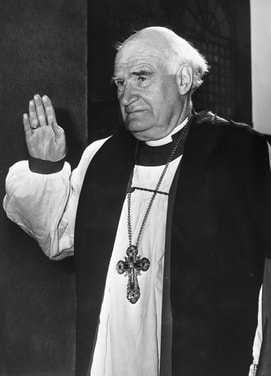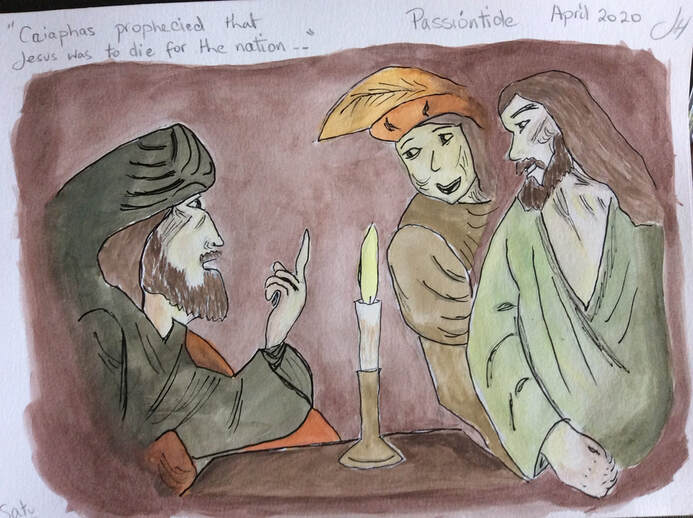 What strikes us in our Mass readings for today (https://universalis.com/mass.htm) is the recurring theme of the scattered people. “I shall make them into one nation” we read in Ezekiel. The Psalmist sings “He who scattered Israel will gather him and guard him as a shepherd guards his flock”, and in the Gospel, Caiaphas does not understand that Jesus will not die just for one nation, “but to gather together in unity the scattered children of God”. Today, the divided nation of Israel has been substituted by the divided Christianity. I would like to share with you some thoughts on Christian unity by Michael Ramsey (1904-1988), my very favourite Anglican author, and – for me – the most inspiring Archibishop of Canterbury (1961-1974). The following passage is from his seminal book The Gospel and the Catholic Church which he published in 1936, long before made the Bishop of Durham in 1952 and Archbishop of York in 1956. IS CHRIST DIVIDED? Is Christ divided? In all these ways Catholicism has appeared in broken fragments of what it is meant to be. It is severed into at least three main elements, the Latin, the Eastern Orthodox and the Anglican. Its historic order is obscured by these divisions; the place of the Episcopate as the order of the Church’s universal life and the meaning of the sacraments as the acts of the one Body is sometimes hidden from the sight. The name “Catholic” is often linked to piety which is individualistic, and to systems which are sectarian and incomplete. A cry is forced from Christian’s lips, “is Christ divided”? Yes, if the rent in the robe of Christ has been a part of His Passion, there has been in the midst of it the power whereby the saints are made, and whereby civilizations are moulded. Hence the broken history of the Catholic Church is a manifestation in flesh and blood of the Way, the Truth, and the Life. Not only in the saints whose names the Church commemorates, but in men and women whose lives have been secret, a love and humility have been seen whose roots are in heaven. Such men and women, and countless others also, are ever less conscious of what the Church had failed to do than what the Church has done and is doing within them, and its name spells only thankfulness and praise. The quest of ideal Catholicism must not seem to deny the actual. If the partial character of every presentation of Catholicism in history seems to say “It doth not yet appear what we shall be,” the testimony is sure which says “Beloved, now are we sons of God.” For the essence of Catholicism all through the ages has consisted not in partial systems – such as Papal government or Greek theology – which have been both its servants and its dividers, but in the unbreakable life to which the sacraments, scriptures, creeds and ministry have never ceased to bear witness. Unity, therefore, exists already, not in what the Christians say or think, but in what is doing in the one race day by day. And the outward recovery of unity comes not from improvised policies, but from faith in the treasure which is in the Church already. But recovery is hindered whenever Catholicism is identified with something less than itself, and whenever the definition of it is based upon what is really local, temporary, partial. Hence the opportunity is great for Anglican Catholics - in view of their greater freedom and their contact with many phases of Catholicism – to teach the richest and deepest meaning of the word Catholic and to find the essence of Catholicism not in particular systems of government or thought or devotion (Anglican or Latin) but in the organic, corporate idea of the Body in life and worship. They do this not by looking exclusively to developments of modern Romanism and equating them with Catholicism, not yet by looking to their own or any partial standards. They will indeed look and learn in both these ways, but they will search behind and within for the fact of the Corpus Christi. By Fr Tomas Illustration by Jan Hearn © Photo of Michael Ramsey: Creative Commons Attribution-Share Alike 3.0 nl
1 Comment
Sue Davis
4/4/2020 11:42:23 pm
Thank you Fr Tomas
Reply
Leave a Reply. |
Lucy Stothard & Fr David & Fr TomasLucy is an Intern at S Giles, Fr Tomas is is our curate, and Fr David is the vicar. We hope to offer some regular words of encouragement during this difficult time. Archives
May 2020
Categories |


 RSS Feed
RSS Feed
